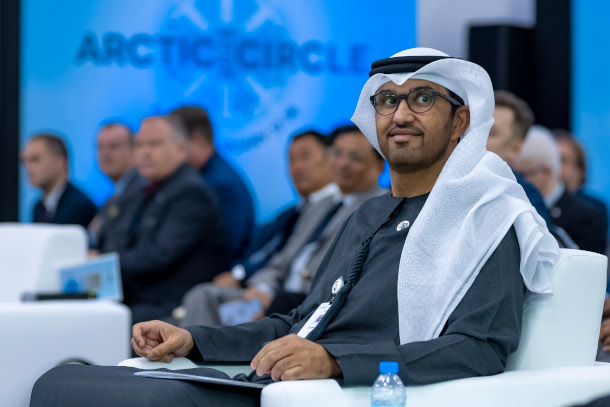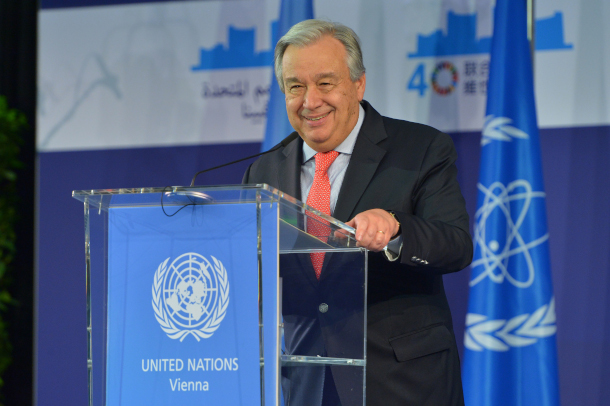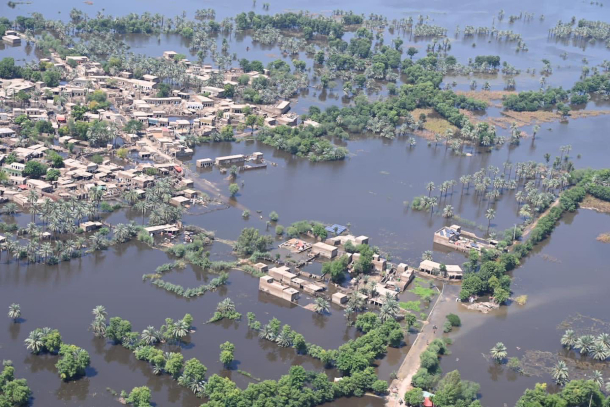The UAE Boosts Climate Pledge
Air Date: Week of July 28, 2023

Sultan Al Jaber, the chief executive of the UAE's Abu Dhabi National Oil Company and president of this year's Cop28 UN climate summit. (Photo: Arctic Circle, Flickr, CC BY 2.0)
The UAE has increased its climate ambition targets under the Paris Agreement following criticism around their choice of a top oil executive to lead this year’s UN climate talks. But researchers claim the UAE is unlikely to meet its climate targets given its plans to boost oil and gas production. David Tong, the Global Industry Campaign Manager for Oil Change International, joins host Aynsley O’Neill to explain what the UAE policy means for COP28.
Transcript
CURWOOD: It’s Living on Earth, I’m Steve Curwood.
O’NEILL: And I’m Aynsley O’Neill.
Amid controversy the United Arab Emirates is hosting this year’s United Nations climate negotiations known as COP28. And in answer to criticism the UAE’s Ministry of Climate Change and Environment recently said the country plans to cut emissions by 40% from business-as-usual by 2030. The UAE had earlier pledged a 31% reduction, but increased its commitment after an uproar over the designstion of the top executive of the UAE’s national oil and gas company to lead COP28. The research consortium Climate Action Tracker casts doubt on the UAE to meet its climate targets if it sticks with plans to boost oil and gas production. One of the critics of the UAE climate policy and its role in COP28 is David Tong, the Global Industry Campaign Manager for Oil Change International, who joins us from Wellington, New Zealand. David, welcome to Living on Earth!
TONG: Hi, Aynsley, nice to meet you.
O'NEILL: Now, the UAE has faced a lot of criticism after appointing Ahmed Al Jaber, as the President designate, for the upcoming COP 28 talks. He's the CEO of the Abu Dhabi national oil company. Can you tell us a little bit more about that?
TONG: Yeah. So every year the UN Climate Negotiations are presided over by a senior diplomat from the host country. This year, the UAE has appointed Sultan Al-Jaber as the president designate, he'll become the president at the start of the negotiations this November. And for the first time a country has appointed someone who is not just an employee of oil or involved in, but is the CEO of an oil gas company at NOC the Abu Dhabi National Oil Corporation. They are on track to be the second largest expander in terms of companies with the most expansion in new oil and gas from this year until 2025. So it's really concerning to have him presiding over the UN's crucial climate change negotiations. It's like putting the CEO of Philip Morris in charge of a conference on lung cancer.
O'NEILL: And the United Arab Emirates has just announced the change in its emissions target. Why did they change that now?
TONG: We can't say exactly why the UAE made that change now, it's a question they'd have to answer. But what we can say is what it looks like. And what it looks like is a presidency a country under intense pressure given their extraordinary conflict of interest, that is trying to salvage their credibility by framing themselves as a climate leader, without actually taking meaningful action to achieve this.

UN Secretary-General António Guterres at the fortieth anniversary of the Vienna International Centre. UN Secretary-General António Guterres has urged countries to “progressively phase out fossil fuels, moving to leave oil, gas and coal in the ground where they belong”. (Photo: IAEA, Flickr, CC BY 2.0)
O'NEILL: And from what you're seeing what sort of domestic policies are they planning to put in place in order to reach these targets?
TONG: The domestic policies that the UAE is putting in place have not changed significantly with this new target, and they are grossly insignificant. They plan to do some positive things like phasing out coal. But on the other hand, they're all in on expanding the use of fossil gas, which is completely at odds with both their climate targets and with what the world needs for 1.5 degrees. Both the Intergovernmental Panel on Climate Change and the International Energy Agency have made it clear that there's no room for new oil and gas, if we are to achieve the objectives of the Paris Agreement and limit warming to 1.5. Where the UAE is hoping to massively expand their reliance on the gas they produce and the guests they export in their new climate pledge. This has been rated by independent experts at climate action tracker as insufficient at odds with Paris objective and consistent with warming the world by around three degrees.
O'NEILL: Now, if they're planning to continue this reliance on fossil fuels, how exactly are they going to keep on pace for these targets? How much of this has to do with carbon offsets and carbon credits?
TONG: The UAE has made it very clear that they see it necessary to phase out fossil fuel emissions and argue that that is somehow possible to do without phasing out fossil fuels. That is simply false. And the UAE is planning to do this is through claiming that they can use dangerous distractions like carbon capture and storage. They want to develop industrial processes to draw down carbon dioxide from the atmosphere and stored underground. However, no CCS scheme is cost effective, almost all deliver less than promised. And the only scheme under development currently in the UAE if it did all that it promises to do only drawdown less than 0.5% of the country's annual emissions. So they're hoping to distract us with these technological magic fixes that don't actually work and just serve as a smokescreen to allow for continued oil and gas production.

An aerial photo of flooded Sindh province in Pakistan in August 2022. Pakistan is a “poster child for impacts” from climate change, Alden Meyer says, since losses and damages from those floods could total $30 or $40 billion. (Photo: Ali Hyder Junejo, Flickr, CC BY 2.0)
O'NEILL: Now I want to take a step out and look a bit more globally. At the last climate talks COP 27 a loss and damage fund was established. That's a fund aimed at aiding vulnerable countries hit hard by climate disasters. What is the status of that project? And what hope is there that the project is going to be pushed forward during COP 28?
TONG: Last year was a breakthrough for loss and damage finance with the establishment of a loss and damage fund. That's the culmination of over 10 years of negotiations, and was a huge win for particularly at least developed countries and Africa and small island developing states especially in the Pacific. It was a breakthrough. And so there's a lot of expectations now for money to be put forward to go into that fund. That will be a critical test for COP 28 alongside the question of whether it delivers a comprehensive package to transform the world's energy systems.
O'NEILL: What does the UAE’s new carbon goal mean for the cop 28 process?
TONG: This may help to salvage some of the ways credibility with certain countries. And it may also send a political signal to encourage other countries to put forward new updated targets this year. But the real question is whether this COP delivers a comprehensive package for energy transformation, cutting to phase out fossil fuels, setting a target for renewable energy deployment and energy efficiency and providing safety measures to protect people and communities and finance to make this all possible. That's the real test and it's not clear that the UAE presidency is equipped to deliver this.
O'NEILL: David Tong is the Global Industry Campaign manager for Oil Change International. David, thank you so much for taking the time to join us today. T
TONG: Thanks Great to be here.
O’NEILL: In response to the Climate Action Tracker analysis the UAE's Ministry of Climate Change and Environment said "The UAE is fully committed to achieving its ambitious emission targets."
Links
Reuters | “UAE Says It's Committed to Meet CO2 Emissions Targets After Criticism”
Living on Earth wants to hear from you!
Living on Earth
62 Calef Highway, Suite 212
Lee, NH 03861
Telephone: 617-287-4121
E-mail: comments@loe.org
Newsletter [Click here]
Donate to Living on Earth!
Living on Earth is an independent media program and relies entirely on contributions from listeners and institutions supporting public service. Please donate now to preserve an independent environmental voice.
NewsletterLiving on Earth offers a weekly delivery of the show's rundown to your mailbox. Sign up for our newsletter today!
 Sailors For The Sea: Be the change you want to sea.
Sailors For The Sea: Be the change you want to sea.
 The Grantham Foundation for the Protection of the Environment: Committed to protecting and improving the health of the global environment.
The Grantham Foundation for the Protection of the Environment: Committed to protecting and improving the health of the global environment.
 Contribute to Living on Earth and receive, as our gift to you, an archival print of one of Mark Seth Lender's extraordinary wildlife photographs. Follow the link to see Mark's current collection of photographs.
Contribute to Living on Earth and receive, as our gift to you, an archival print of one of Mark Seth Lender's extraordinary wildlife photographs. Follow the link to see Mark's current collection of photographs.
 Buy a signed copy of Mark Seth Lender's book Smeagull the Seagull & support Living on Earth
Buy a signed copy of Mark Seth Lender's book Smeagull the Seagull & support Living on Earth

